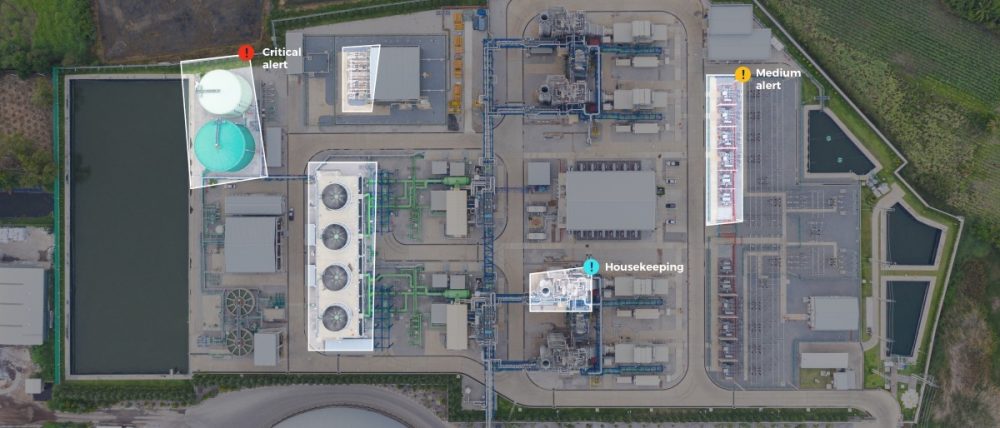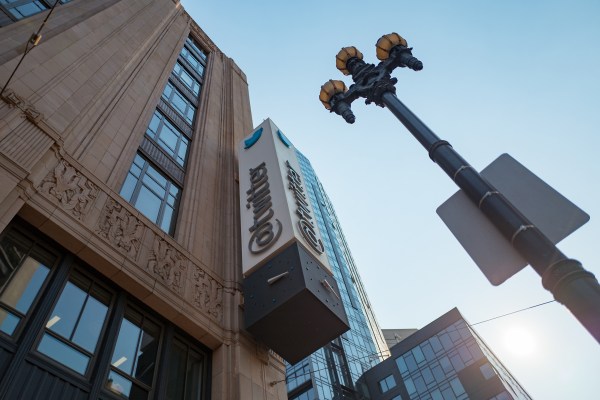Percepto flies high with $67M for its industrial drones
Percepto, a drone startup that is building a sizable business with its software and hardware for industrial drone applications, is today announcing a big round of funding to take its operations to the next level — both literally and figuratively.
The startup — headquartered in Austin, Texas, but founded and with roots in Israel — has raised a Series C of $67 million, composed of around $50 million in equity and $26 million in debt funding.
And alongside this, the company is using the funding to also make public an important breakthrough it has had on the regulatory front. Percepto (not to be confused with the Israeli reputation management startup of the same name) has become the first industrial drone company to get a nationwide Beyond Line of Sight (BVLOS) waiver from the FAA in the U.S. This is significant not least because in the opinion of Dor Abuhasira, Percepto’s co-founder and CEO, regulation — not technology — has been the biggest roadblock to the growth of the drone industry, something that has now started to change.
“I think that the biggest shift in the last few years has been around regulation,” he said in an interview.
The waiver in essence means removing some of the friction Percepto and its customers faced: the startup will not need to get site-specific approvals from the regulator for deployments of its remotely-operated drones when working with clients in areas of “U.S. critical infrastructure”; and these installations and operations will no longer require additional deployments of people or radars — all of which will speed up roll outs, reduce costs, and presumably drive more business Percepto’s way.
The equity portion of the funding getting announced today has a number of strategic backers in it, alongside financial investors, which speak to what (and who) is fueling Percepto’s growth.
As with the startup’s $45 million Series B in 2020, Koch Disruptive Technologies (KDT), the investment arm of the industrial giant, is leading this Series C, alongside new backers Zimmer Partners and a very large U.S. energy company that is not being named. U.S. Venture Partners, Delek US Holdings, Atento Capital, Spider Capital and Arkin Holdings — all previous backers — are also participating. It brings the total raised by Percepto to $120 million, and while the company is not disclosing its valuation, Abuhasira confirmed that it is an upround.
The investors and customers — named customers include Siemens Energy, Delek US, Koch Industries companies and ICL Dead Sea Works — highlight the kind of work that Percepto has been doing and will continue to explore as it grows.
It has pinpointed an opportunity to provide monitoring and maintenance services to clients that have operations in remote or hazardous locations, or across wide areas that are populated with machines rather than humans.
Percepto’s solutions include not just drones — currently two models, the Max and the Max OGI — but a cloud-based analytics platform that monitors equipment for faults and overall performance and provide other diagnostics that are harder (if not impossible) to collect efficiently through other means. Customers include businesses in sectors like oil and gas, energy, manufacturing and more.
The company’s growth comes amid a lot of ups and downs in the drone industry.
At one end of the spectrum you have a lot of hope (and maybe some hype), in the form of very big funding rounds getting raised by drone startups, even in the current climate.
In addition to today’s round from Percepto, two drone delivery companies, Wingcopter and Zipline, have also recently brought in hefty rounds, respectively $44 million and a whopping $330 million. These numbers speak to a lot of optimism about the uses cases of these devices in business, mission-critical scenarios that go beyond that of leisure (eg, drones as remote-control toys) and lethal weapon (eg, when they are being used in combat, for example in Ukraine, where they’ve been described as “redefining warfare”).
At the other end of the spectrum, there are still a lot of economies of scale to be worked out, alongside that pesky regulation, to get to more sustainable economies of scale. Deployments in more dense landscapes such as urban environments highlight some of the remaining challenges in the market, including reliability of navigation, battery life, and obstacle detection, but these remain issues also for those working in remote environments, as Percepto does.
So does the fact that with the lack of scale, a lot of drone companies continue to operate at a loss.
There is also the issue of how businesses in the connected areas of robotics and drones overall are evolving. When Percepto announced its previous round in 2020, it had just inked a big deal with Boston Dynamics to co-develop solutions with the robotics maker. That highlights another issue in the industry: working together isn’t necessarily as easy or as logical as it looks on paper, and sometimes there just isn’t a market appetite for whatever the product of that partnership might be.
“We still work with Boston Dynamics, but that business hasn’t exploded like drones has,” said Abuhasira. He noted that Percepto these days aims to be more hardware-agnostic, with software that can work with “many different robotics platforms.”
Notably, Chase Koch, who runs Koch Disruptive Technologies, notes that he sees Percepto less as a “drone” investment and more one in the area of robotics.
There is no doubt that drone delivery is an exciting development, but we like the niche that Percepto has carved out as the leader in autonomous inspections of industrial sites.
Their focus on automating the inspection process for industrial companies serves a critical need in the market, especially as operational efficiency and site monitoring take on increased importance. Percepto also demonstrates how industrial companies can combine autonomous systems and the expertise of human workers to drive value and improve safety and operational outcomes.
“We don’t view Percepto as a ‘drone’ investment per se; we view this as using robotics – and today that is primarily drones – to improve the inspection process at industrial sites,” he told TechCrunch. “When we looked at the industry, we saw several companies doing this because it addresses a real business need. But Percepto’s end-to-end approach stood out to us as a differentiator. That diligence and process led to our conviction around Percepto.”
Indeed, this is also why Koch does not think that Percepto’s trajectory will necessarily follow that of other kinds of drone-based businesses, such as those pursuing a delivery play.
“There is no doubt that drone delivery is an exciting development, but we like the niche that Percepto has carved out as the leader in autonomous inspections of industrial sites,” he said. “Their focus on automating the inspection process for industrial companies serves a critical need in the market, especially as operational efficiency and site monitoring take on increased importance. Percepto also demonstrates how industrial companies can combine autonomous systems and the expertise of human workers to drive value and improve safety and operational outcomes.”




